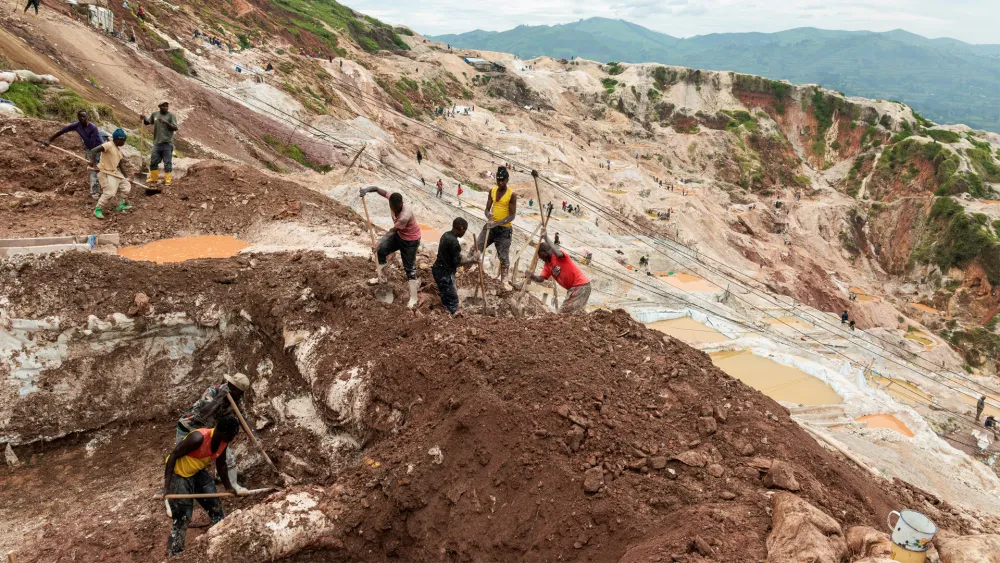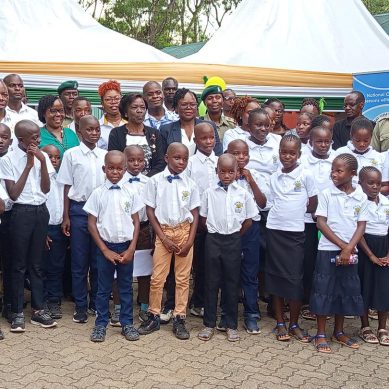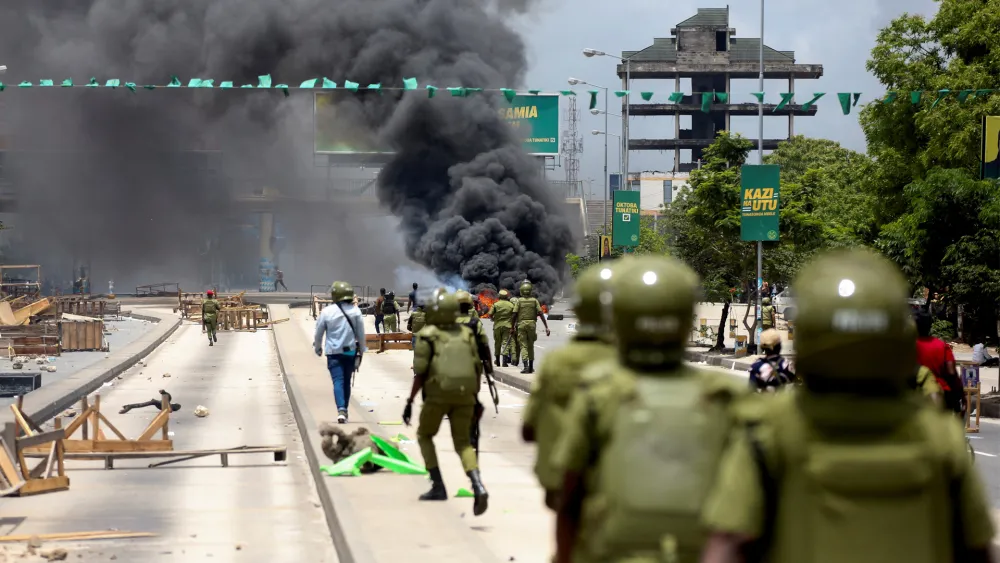
It has been several months since the signing of a US-brokered peace deal between the Democratic Republic of the Congo and Rwanda and a separate ceasefire and declaration of principles agreed in Doha between Kinshasa and Rwanda-backed M23 rebels.
Yet neither track has altered the battlefield situation – even as Donald Trump says the war has been “settled” – and Congolese civil society remain sceptical of deals they view as externally imposed and part of a long-term pattern of exploitation.
“It is almost impossible to judge the sincerity of these negotiations,” said Reagan Miviri of Ebuteli, a Congolese research group. “The ceasefire has never been fully respected by either side and frontlines ignite even as dialogues are supposed to continue.”
Mostly led by Congolese Tutsis, the M23 revived a rebellion in eastern DRC in 2021 after years of dormancy. It has been backed by thousands of Rwandan troops and now occupies vast eastern areas, where it has established a parallel administration.
The rebellion escalated earlier this year, when the M23 and Rwandan troops seized DRC’s biggest eastern cities – Goma and Bukavu – marking the collapse of previous peace negotiations and triggering the state’s most serious crisis in decades.
The Washington deal, signed in June, set out a de-escalation framework whereby DRC would dismantle Rwandan rebels on its soil while Rwandan troops would withdraw from the east, where 5.2 million people are displaced, including 1.6 million uprooted this year.
Yet so far, Rwandan forces remain on the ground, Congolese efforts against Rwandan rebels have been limited and provisions in the agreement to expand American access over Congolese minerals have triggered significant concerns.
“At times, we really get the feeling that some are more eager to secure economic and geopolitical positions than to build a lasting peace for the people who have been suffering for far too long,” said Miviri.
Meanwhile, in Doha, the ceasefire commitment agreed to by both parties in July has been continuously violated and a late-August target to strike a full peace deal has long passed.
The Congolese army has recently hired new foreign mercenaries to support its troops, while the M23 has carried out some of its worst massacres while expanding its areas of control – leaving little confidence locally in the prospects for peace.
“On the ground, the group continues to commit atrocities, from forced recruitment to attacks against civilians,” said Vascos Saasita, a Congolese lawyer and rights activist: “This discrepancy between rhetoric and reality makes their intentions more than questionable.”
The M23 descends from a line of DRC armed groups backed by Rwanda. Support began in the 1990s as Rwanda’s new government hunted down Hutu extremists who had fled to DRC after perpetrating the 1994 genocide against the Tutsi.
Rwanda says genocidaire militias in DRC still pose a threat to its security. In particular, it has criticised the Congolese army’s recent collaborations with the FDLR, the heirs of the Hutu forces that carried out the genocide.
However, most independent analysts say Congolese support for the FDLR was a response to Rwanda’s backing of the M23, and that Kigali’s true motive is to boost economic and political control over eastern areas it believes it has a historic right to.
Nonetheless, the Washington deal committed DRC’s army to neutralise the FDLR – which is referenced far more in the deal than the M23 – and Rwanda to end what the text terms “defensive measures”, a euphemism Kigali uses for its deployments.
Some progress has been reported: Last month, the Congolese army called on FDLR fighters to disarm and in recent days it has been broadcasting messages with megaphones, through local radio stations, and by dropping leaflets from aircraft.
But sequencing, as in past agreements, has proved difficult: Rwandan officials have said they will withdraw troops only after the FDLR is neutralised while Kinshasa views this as a stalling tactic and argues the two steps should occur simultaneously.
“This divergence alone shows that they are signing commitments they never intended to implement,” said Stewart Muhindo, a researcher and activist with La Lucha, a prominent Congolese civil rights movement. “Sincerity is clearly lacking.”
The army, meanwhile, says it can only act within areas under its control, and that many FDLR fighters are actually based in territory occupied by the M23 – positions the rebels would need to vacate for the military to carry out its mandate.
“It was an impossible promise to keep and everyone knew it,” said Muhindo. “These groups are entrenched in areas that are controlled by the M23, where Kinshasa has no access.”
In any case, there are fears that forcibly disarming the group could expose civilians to abuses as has happened during previous government attempts to root out the FDLR, which has several thousand fighters but only poses a limited threat to Rwanda.
M23 operations against the group in recent months have already caused extensive suffering. In July, it launched a major offensive in Rutshuru territory, during which survivors described summary executions of hundreds of mostly Hutu civilians.
Some say the Rwandan state actually benefits from keeping the FDLR alive as a pretext for internal repression and its military ventures, which are generating rising volumes of smuggled Congolese minerals and indicate a push for permanent control.
Even more controversial has been the US using its mediation role to boost American investment in Congolese minerals – reflecting a broader transactional approach to peace-making that has characterised the Trump administration.
Long a frontier of capitalist and colonial extraction, DRC holds vast reserves of critical minerals that are central to the global economy, and the US appears eager to outflank China’s dominant position in exploiting them.
Since the Washington deal, US companies – including ones backed by Jeff Bezos, Bill Gates, and various former US military and intelligence figures – have moved to secure access to lithium, copper and cobalt.
Muhindo said the business dealings shows how DRC has been “reduced to a mining zone for the benefit of various foreign interests, rather than a country that we want to stabilise”.
Rebecca Kabuo, another human rights defender, echoed this critique, arguing that the peace process “resembles a trading floor” for powerful interests, instead of “a genuine space for dialogue on justice and the security of populations.”
François Kamate, a climate activist added: “The negotiations serve primarily to protect foreign economic and geopolitical interests. What attracts Washington, Doha, or other powers is strategic minerals, not the tears of displaced families.”
Other analysts have criticised the Washington accord for focusing solely on DRC and Rwanda when other regional countries have also been heavily involved in the conflict. This includes Uganda, which has supported the M23 and maintains troops in the east – from where it receives smuggled gold – and Burundi, which has backed the Congolese army during the conflict.
For its part, the Doha talks represent a positive step in so far as President Félix Tshisekedi has previously been unwilling to directly negotiate with the M23, which he had hoped to defeat militarily.
Although a declaration of principles has been signed, an August 18 deadline to finalise a peace deal was missed, with dialogue so far focusing largely on preconditions and confidence-building measures, such as ceasefire monitoring and prisoner swaps.
The talks have not involved the myriad abusive pro-government militias – known collectively as Wazalendo – which have played a central role in the conflict and will want their own demands reflected in any eventual settlement.
“Not all key players have been invited to the negotiating table, neither the Wazalendo, who are very present on the ground, nor the political opposition,” Miviri of Ebuteli said. “How can an agreement be credible if part of the reality is left out?”
What the M23 ultimately seeks from Doha remains unclear – The New Humanitarian has not spoken with sources inside the group – especially as its objectives and motives have shifted over the course of the conflict.
Initially, the group cited a broken peace deal by Kinshasa and discrimination against Tutsi communities as reasons for fighting. It sought amnesty for past violence, the integration of its fighters into the army and the return of Congolese Tutsi refugees.
But it has since formed a political wing with national figures who oppose Tshisekedi. They frame their struggle in terms of broader governance failures and have even called for a federal political system that would allow them to govern autonomously.
Although the declaration of principles called for state authority to be restored “on all national territories” as part of an eventual deal, the M23 said afterwards that it would not withdraw from occupied territories even by a metre.
Among the proposals reportedly put forward by M23 negotiators are power-sharing across national institutions, the reconstitution of the army and a special status for eastern DRC that would grant it some kind of administrative autonomy.
Such a power-sharing arrangement would recall the early 2000s, when peace processes following post-genocide Rwandan-backed rebellions in DRC folded rebel leaders into national institutions and security structures.
Many Congolese would likely oppose a return to this model, believing that it entrenches impunity and creates incentives for future rebellions, especially as there are more than 200 other armed groups active in the east.
“If we sign an agreement only with the M23, without including all the other groups, we open a very dangerous door,” said Miviri. “Other armed movements will say: ‘What about us?’. This could become a race to the bottom.”
Muhindo, from La Lucha, shared the same view: “An agreement with the M23 under the current conditions would send an extremely dangerous message: take up arms, kill, align yourself with a neighbouring country, and you’ll end up invited to the table.”
In a report last month, the New-York based Congo Research Group said the various actors involved in the conflict all have incentives for it to continue in some form or another.
Tshisekedi, for instance, might face significant backlash from political elites and civil society if he granted too many concessions to the unpopular M23, while the rebels benefit from a war economy and may fear the risk of switching to civilian politics.
“For many, peace is costly, as it requires difficult reforms, a switch from a conflict economy to a peacetime one and produces a shift in power from armed actors to civilians,” the report stated.
“Many people within the M23 think this deal will take years to implement and they will be left in control governing a large part of the eastern Congo for years to come,” Jason Stearns, the founder of the Congo Research Group, told The Nation magazine.
Whatever the outcome of the talks, Marie-Louise (who asked for her real name not to be used for security reasons), another human rights activist in eastern DRC, said the process should not be disconnected from those who are bearing the brunt of the war.
“Peace cannot be decided in air-conditioned rooms in Doha or Washington,” she said. “Women and young people like me are systematically excluded from the discussions, even though we should be the main architects of them.”
- A Tell Media report





